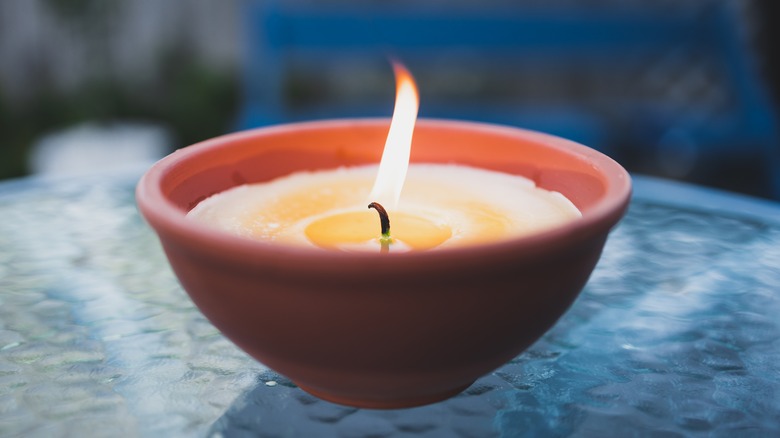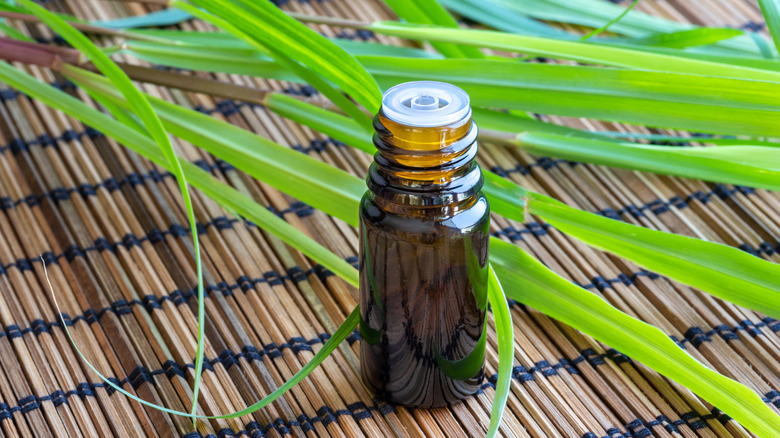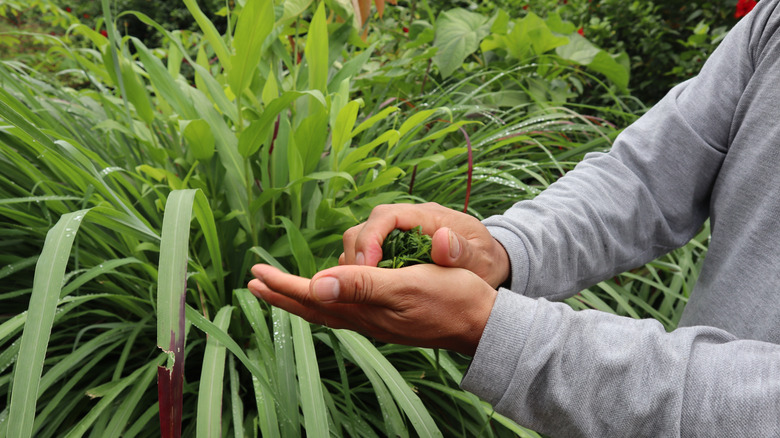The Most Important Place To Use Citronella That You're Probably Missing
Citronella is as synonymous with summer as sunscreen and margaritas. Popularly known as a mosquito repellant, citronella oil is an affordable and natural way to keep bugs away from the neighborhood barbecue. According to the National Pesticide Information Center, the oil doesn't kill backyard pests as many chemicals do — it, instead, prevents them by masking the scents they are attracted to. When mosquitos and other insects can't locate a scent, they are less likely to bite and become a nuisance. If you live in a rural area, citronella can also mask the scents that other animals are attracted to, which can potentially help to prevent deer, bears, and other unwanted visitors.
According to WebMD, there are two different types of citronella oil — Sri Lanka (Seyla) citronella oil and Java citronella oil. While both are used as an insect protectant, there are other places you can use this helpful item that you might be missing out on.
Citronella as essential oil
Citronella grass is mostly used to produce a beneficial essential oil. Essential oils have become wildly popular over the last decade, and this one is no exception. As reported by New Directions Aromatics, this oil can be used in a diffuser to ease congestion and throat irritation. It might also be able to boost your mood and bring a sense of calm.
Blend citronella with lavender and peppermint if you are looking for physical relief from a cold, congestion, or infection. You'll likely find yourself more relaxed and less anxious in no time. Those who believe in aromatherapy consider citronella a grounding oil because it can soothe conflicting emotions and calm the mind. Is it true? You may just need to test it out yourself.
All told, citronella is great as a mosquito repellant in the summer, but its most important use is definitely your health year-round. This versatile oil has the potential to keep you at peace, calm your home, and possibly bring quick healing to some common ailments, like digestion, fluid retention, and parasites (via WebMD).
Citronella in your garden
There are two species of citronella — citronella geranium and citronella grass. Pelargonium citronella is the botanical name for citronella geraniums — the plant you can bring indoors and which smells amazing per Ann's Entitled Life — and Cymbopogon nardus is the name for citronella grass, from which the beneficial oil is made. Citronella grass is also a perennial in USDA hardiness zones 10 through 12; however, it is sometimes planted as an annual in colder climates.
In addition, many nurseries may sell florae under the term "citronella," other than the well-known grass. In this case, the plant you are buying is probably a citronella-scented geranium, which is sometimes marketed as a mosquito-repelling cultivar but is unsuccessful at keeping the insects away. If you've picked up a plant with lacy leaves rather than grass blades, it's safe to say you've got the wrong variety.
In the garden, citronella grass is an effective companion plant because pests, including whiteflies, are scared off by its potent lemon aroma. Place the citronella grass you are growing in a spot where it can get bright yet filtered sunlight. According to Neverland, this glass type prefers moist, loamy soil, and when fully grown, it can grow in clumps up to 6 feet tall and 4 feet broad, making it a relatively large plant.



